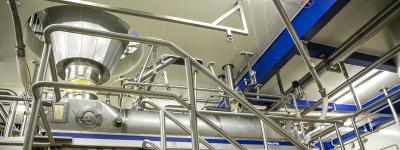He says the growth in the sheep milk industry in the Waikato region requires extra capacity, hence the need for the new dryer, which could be online by June 2019. Currently the existing dryer processes about 900,000 litres of sheep milk each year; that’s expected to double in the 2019/2020 season, Mr Gordon says, and 50% increases are expected yearly after that for the foreseeable future.
Food Waikato is owned by Hamilton City Council and Callaghan Innovation, and both parties have been informed of the plans, Mr Gordon says.
"The existing dryer has more than delivered on its original promises and is now sitting at capacity with 308 days of production in the year to June 2017, and achieving $53 million of exports in that year. We now need to be as proactive as possible and get ahead of this rapidly increasing demand from the sheep milk industry."
The second Dairy Processing Drying facility will have 2.4 times the capacity of the existing Open Access Development Dryer, and will be built alongside the existing dryer at Waikato Innovation Park in Hamilton. It will be the same height as the existing dryer but will have increased levels of biosecurity that will allow it to produce high-grade infant formula and other products. It is projected to deliver $129 million in exports a year.
Food Waikato will contribute about $1.4 million of the $45 million cost, with debt and equity from dryer users making up the balance. Stakeholders Hamilton City Council (70%) and Callaghan Innovation (30%) are not being asked to contribute but are being informed as stakeholders.
The Council’s Executive Director Special Projects Blair Bowcott says Hamilton City Council has been impressed by the rapid uptake of capacity in the existing spray dryer. "We are very pleased to hear about the next step for Food Waikato and know that Waikato Innovation Park is delivering for the region."
The Park, which sits on 17 hectares of land at Ruakura, opened in 2004 with the aim of clustering businesses to help drive economic growth and is now home to 46 tenants who have more than 1600 staff between them. The Park’s property assets are worth $25 million, not including the existing or any future spray dryer, and a master plan for the future growth of the park shows the potential for it to house 2500 staff, add another 12 buildings and be worth $180 million within 20 years.
The Park’s annual tenant survey results show the gross turnover of all Park tenants in 2016 was more than $427 million, up 42% up from $300 million in 2015.
Compared to the national average, Park companies are significantly more likely to be exporting their products or services overseas and to be engaged in research and development.
Some 68% of Park tenants were actively exporting their products or services overseas in 2016, compared to 30% nationally. Some 61% of Park tenants were engaged in research and development last year, compared to 14% nationally. Some 20% of Park tenants reported job growth in 2016, compared to just 2% of companies nationally.
| A Waikato Innovation Park release | January 22, 2018 |||





